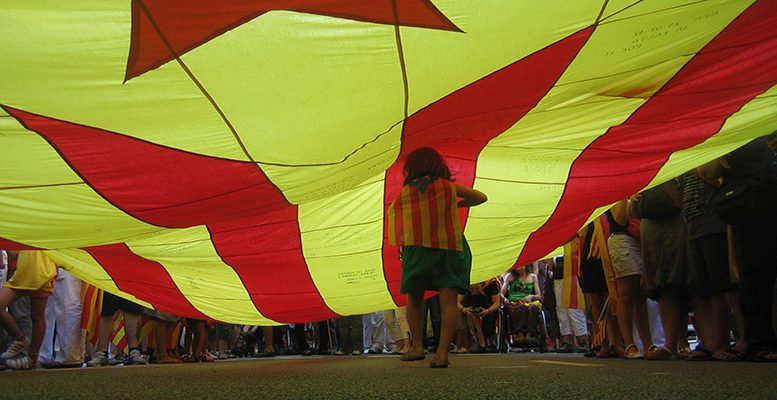Catalan leader Carles Puigdemont had until 10 am on Monday 16 October to clarify whether he has declared independence or not. As was widely expected, he answered PM Mariano Rajoy in an ambiguous way, with neither a clear yes nor a no.
In his letter to Rajoy, Puigdemont limited himself to attaching a variety of documents, like the Referendum Law or the report on the police charges from October 1. Puigdemont defends the path of dialogue and recalls that he “suspended” the declaration of independence to start a “two-month” process, to try to reach an agreement with the central government.
The government, via deputy PM Soraya Sáenz de Santamaría, reproached Puigdemont for continuing to cause confusion by not clearly responding yes or no. But Sáenz de Santamaría also said there is still time, until 10 am on Thursday, to avoid the government applying article 155 of the Constitution.
For his part, Puigdemont is calling for an end to the State’s repression, referring to the violation of basic rights; the freezing of the Govern’s bank accounts; the censorship on media and the internet; the detention of public servants and the “brutal police violence” perpetrated against people who were in the electoral colleges on October 1. Meanwhile, in his letter replying to the Catalan leader, Rajoy flags that applying article 155 is not aimed at suspending Catalonia’s self-government but ensuring that this is exercised within a legal framework. He says it’s the Generalitat itself which has repealed the ‘Estatut’.
According to David Kohl, chief currency strategist at Julius Baer, “it certainly looks as though the crisis could drag on for weeks”. He adds:
Regional elections seem to be just one possible out- in the next months. But pressure also mounts on Catalonia ’ s separatists as the international community said they would not recognise Catalonia and as more Catalan-based companies plan to move away from the region.
On the other hand, Wolfang Bauer said this morning from London that the Spanish 10-year bond has remained firm after the suspension of Catalonia’s independence, only rising 10 basis points during last week. And the risk premium eased to 120 basis points.
Bauer highlighted that over the past two weeks the bond spreads of some Spanish banks, like CaixaBank, or those of real estate firms like Merlin Properties, were quite volatile. But they tightened inmediately after the independence declaration was suspended.
To put things into perspective. He believes the size of the spreads’ moves was fairly small, 10-20 basis points, so the situation is “a far cry from any distressed crisis scenario.” Furthermore, the volatility has been seen as a domestic issue, not affecting the rest of Europe.
Finally, the fund manager does not rule out that if there is further political escalation, in terms of the independence declaration or the triggering of article 155, the bond spread will be volatile once again. This is an ongoing process.
Despite the stubborness of the independentist movement, political, constitutional and, most importantly, economic obstacles make independence a very unlikely and inconvenient move. As David Kolh from Julius Baer explains:
Although it is true that Catalonia belongs to the industrial heartland of Spain, the tense public debt situation makes a 1.125 separation an extremely costly adventure. A lower credit 1.100 rating, discontinuation of fiscal transfers to the region, no free access to the EU market or the European Stability Mechanism (ESM) , no participation in the European central bank’s (ECB) asset purchasing programme and no access to the euro impose prohibitively high economic hardship. Severe second-round effects include the exodus of companies or at least their respective headquarters.
Economic growth in Spain is robust and the recent figures from the purchasing managers ’ index is an indication that business confidence is holding up despite the political noises from Catalonia.
Analysts at the house expect gross domestic product (GDP) growth of 3.1% in 2017 after a very robust 3.2% expansion last year.
Meanwhile, the loop continues looping. The CUP, the most radical independent party supporting the Catalan coalition governing Catalonia, is criticising Puigdemont’s letter to Rajoy because of its conciliatory tone.
*Image: Flickr / Calabepa





